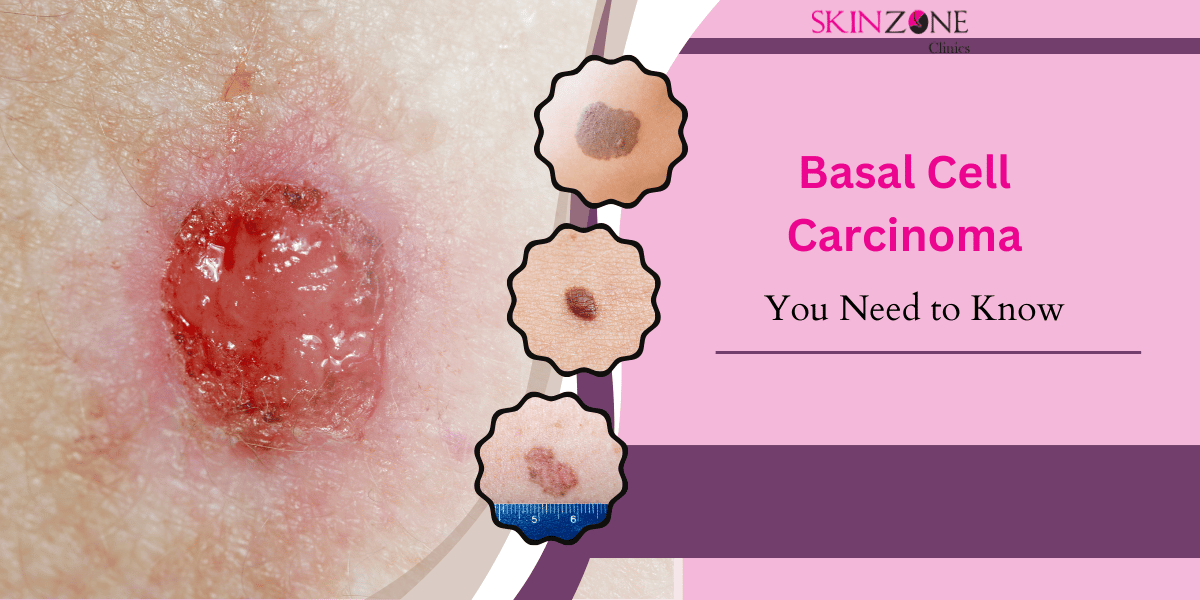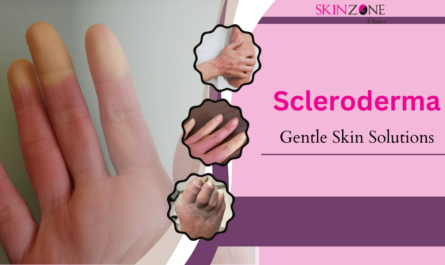Skin cancer is one of the most common forms of cancer globally, and among its various types, Basal Cell Carcinoma (BCC) is the most prevalent. Although it is typically slow-growing and rarely spreads to other parts of the body, it still requires immediate attention. Understanding BCC is vital for early detection and effective treatment. In this blog, we will explore the basics of Basal Cell Carcinoma, its causes, symptoms, treatment options, and some preventive measures to protect your skin from this condition.
What is Basal Cell Carcinoma?
Basal Cell Carcinoma (BCC) is a type of skin cancer that originates in the basal cells, which are located in the lowest layer of the epidermis (the outermost skin layer). These cells are responsible for producing new skin cells. When these basal cells grow uncontrollably, it leads to the formation of tumors. BCC is often mistaken for other skin issues due to its appearance, which may resemble a sore, growth, or a bump.
BCC is the most common form of non-melanoma skin cancer, and it typically grows slowly over time. The good news is that BCC rarely metastasizes or spreads to other organs, making it one of the least aggressive types of skin cancer. However, if left untreated, it can lead to significant tissue damage, scarring, and potential disfigurement.
Types of basal cell carcinoma
Basal Cell Carcinoma (BCC) can present in several different forms, each with its own unique characteristics. The most common types of BCC include:
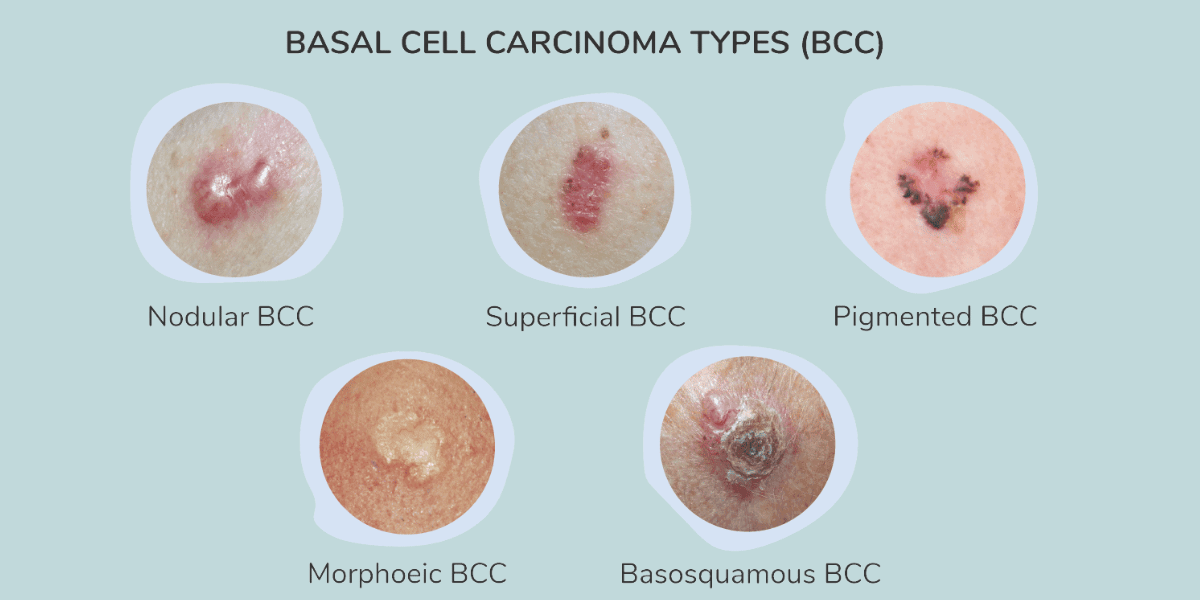
- Nodular BCC: This is the most common type of BCC. It typically appears as a pearly, translucent bump or nodule on the skin, often with visible blood vessels. It is usually found on sun-exposed areas like the face, neck, and ears.
- Superficial BCC: This type of BCC presents as a flat, red or pink patch of skin that may be scaly or crusty. It is often mistaken for eczema or other benign skin conditions and is more commonly found on the torso or upper limbs.
- Morpheaform (or Sclerosing) BCC: This type tends to be less noticeable at first, appearing as a firm, pale, or scar-like area. Morpheaform BCC can be more aggressive and may infiltrate deeper layers of the skin, making it harder to treat. It is typically found on the face or scalp.
- Cystic BCC: This type of BCC appears as a dome-shaped cyst with a smooth surface. It often looks similar to a pimple but can develop into a larger, fluid-filled lesion. Cystic BCC is often found on the face and is commonly mistaken for a sebaceous cyst.
Each type of BCC behaves differently, but they all share the same potential for causing tissue damage if left untreated. Identifying the type early is crucial for choosing the most effective treatment approach.
Causes, Symptoms, and Common Concerns
Causes of Basal Cell Carcinoma
The primary cause of Basal Cell Carcinoma is excessive and prolonged exposure to ultraviolet (UV) radiation from the sun. UV radiation damages the DNA in skin cells, leading to mutations that can result in cancerous growths. Tanning beds and other artificial sources of UV radiation also contribute to the development of BCC.
Several factors can increase the risk of developing BCC:
- Fair Skin: People with lighter skin tones, who are more sensitive to sun exposure, are at a higher risk.
- Age: BCC is more common in older adults, as sun exposure accumulates over time.
- History of Sunburns: Those who have had multiple severe sunburns during childhood or early adulthood are more likely to develop BCC later in life.
- Immune System Weakness: Individuals with weakened immune systems, such as organ transplant recipients or those with HIV, are at higher risk.
- Genetics: A family history of skin cancer or certain inherited conditions (like Gorlin syndrome) can increase the risk of BCC.
Symptoms of Basal Cell Carcinoma
BCC may appear in various forms, making it important to be aware of its different presentations. Common signs include:
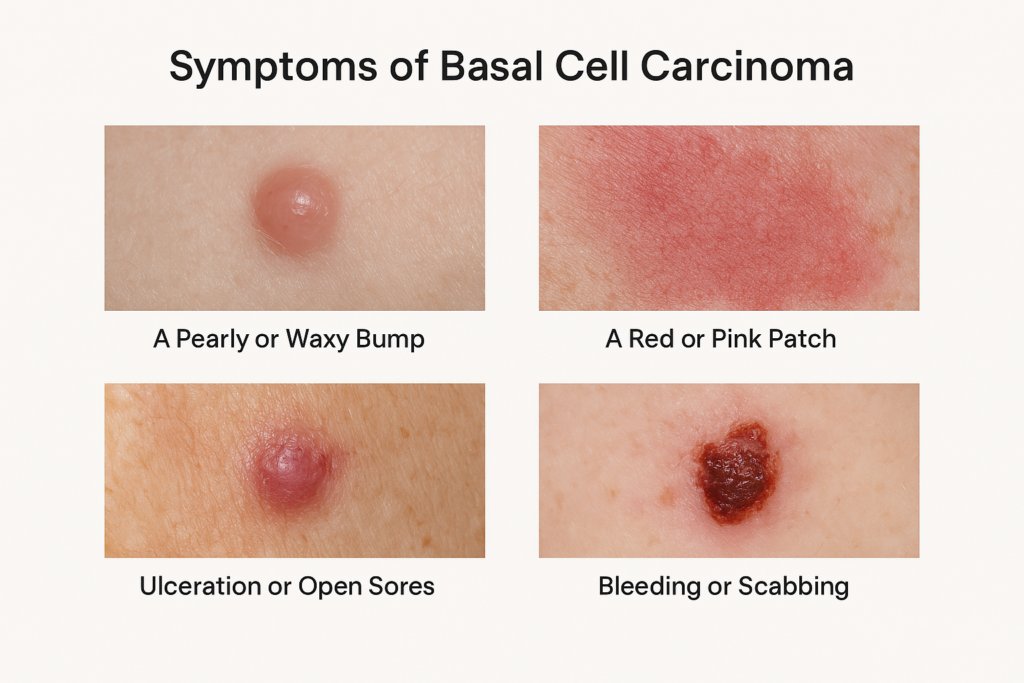
- A Pearly or Waxy Bump: The most typical symptom of BCC is a small, raised, shiny bump, often with a translucent appearance.
- A Red or Pink Patch: BCC may also appear as a flat, red patch of skin that can become crusty or bleed.
- Ulceration or Open Sores: In some cases, BCC may form an open sore that doesn’t heal.
- Bleeding or Scabbing: BCC lesions can occasionally bleed or form scabs.
If you notice any changes in your skin that persist or worsen over time, it’s crucial to seek medical advice promptly. Early detection and treatment are key to preventing further complications.
Where will I find symptoms of basal cell carcinoma?
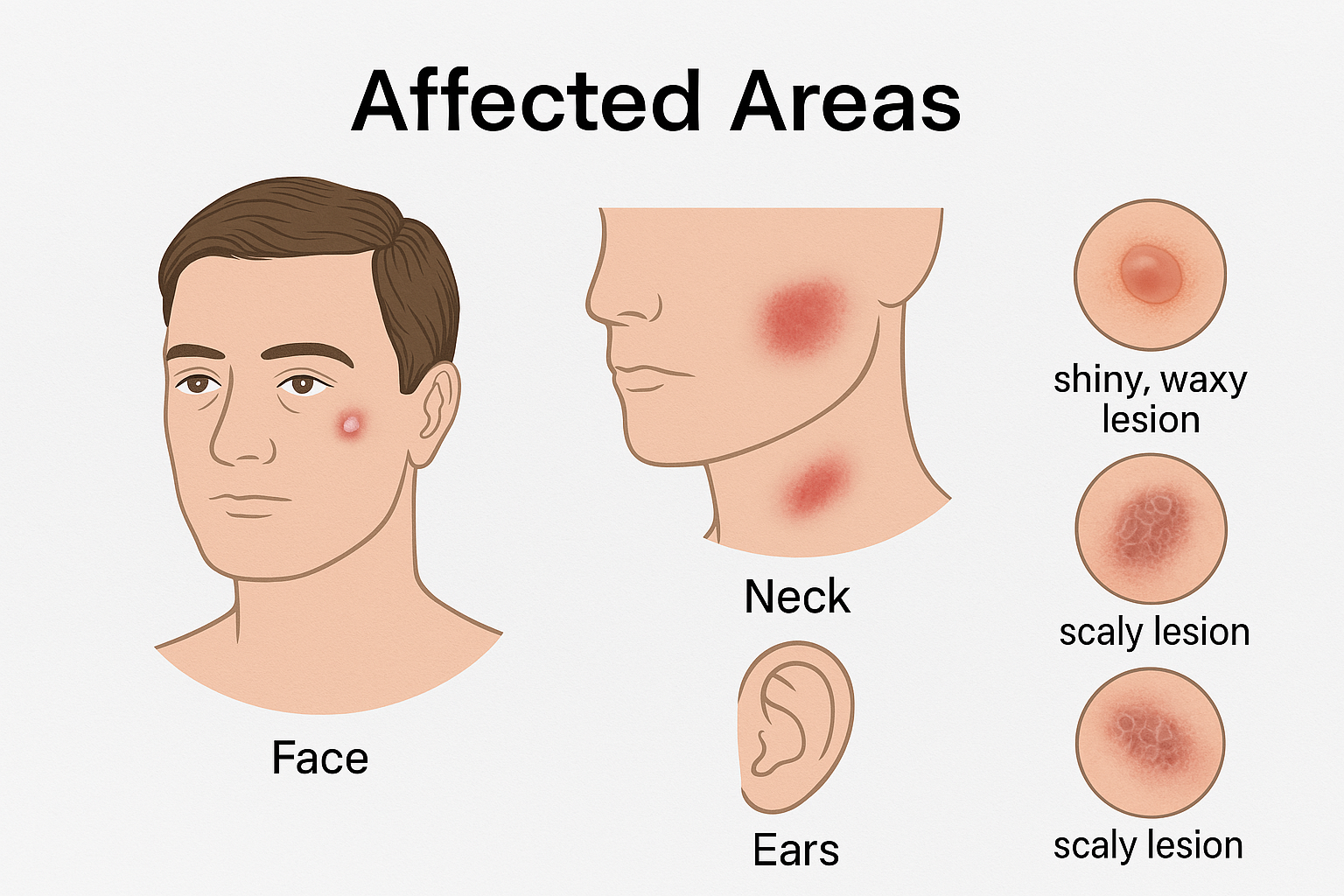
Symptoms of Basal Cell Carcinoma (BCC) typically appear on areas of skin that have been exposed to the sun, such as the face, neck, and ears. Common signs include a pearly or translucent bump, a flat, red patch, or an open sore that may bleed or crust over. In some cases, BCC can appear as a shiny, waxy, or scaly lesion that doesn’t heal. It’s important to monitor any skin changes and consult a dermatologist if you notice unusual growths, persistent sores, or lesions that don’t improve over time. Early detection can lead to more effective treatment and prevent further complications.
Treatment Options for Basal Cell Carcinoma
The treatment for Basal Cell Carcinoma is highly effective, especially when the cancer is detected early. Here are some common treatment options:
- Surgical Excision: The most common method for treating BCC involves surgically removing the tumor along with a small margin of healthy tissue to ensure all cancerous cells are removed. This is often a straightforward procedure performed under local anesthesia.
- Mohs Micrographic Surgery: This specialized technique is used for tumors in delicate areas such as the face. During the procedure, thin layers of cancerous tissue are removed and examined under a microscope until all cancerous cells are gone. This method helps preserve as much healthy tissue as possible.
- Cryotherapy: In this procedure, the BCC tumor is frozen with liquid nitrogen, causing the cancerous cells to die. Cryotherapy is typically used for smaller, less aggressive lesions.
- Radiation Therapy: For patients who are not candidates for surgery, radiation therapy may be recommended. It uses high-energy rays to destroy cancer cells, though it may take several weeks to see the full effect.
- Topical Treatments: In some cases, especially for superficial BCC, topical treatments like imiquimod cream or 5-fluorouracil may be prescribed. These medications work by stimulating the immune system to fight the cancer cells.
- Photodynamic Therapy (PDT): PDT involves applying a photosensitizing agent to the skin, which is then activated by a specific wavelength of light. This treatment is suitable for superficial BCCs.
Preventive Measures and Expert Recommendations
Preventing Basal Cell Carcinoma is largely about protecting your skin from UV radiation. Here are some expert tips for reducing your risk:
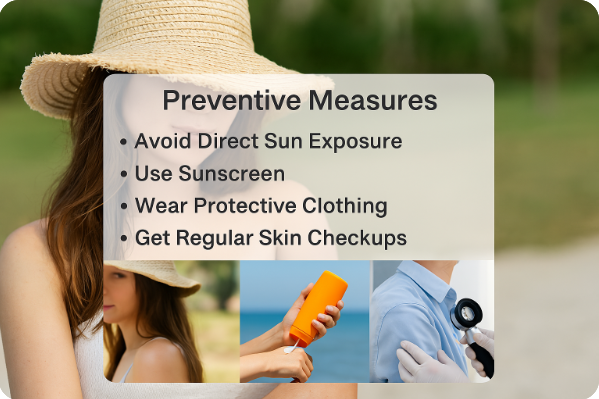
- Avoid Direct Sun Exposure: Try to stay out of the sun between 10 AM and 4 PM when UV rays are strongest.
- Use Sunscreen: Apply broad-spectrum sunscreen with an SPF of at least 30, even on cloudy days. Reapply every two hours, or more often if swimming or sweating.
- Wear Protective Clothing: Hats, sunglasses, and long-sleeved shirts can shield your skin from harmful UV rays.
- Get Regular Skin Checkups: Regular visits to a dermatologist for skin screenings can help catch any changes early, improving the outcome of treatment.
Hospital Introduction
Skinzone Clinics in Borivali, Mumbai, is a trusted destination for advanced dermatology, aesthetic, and trichology treatments. We offer a well-rounded, evidence-based approach to skincare, combining proven technologies with personalized care. Our expert team is committed to long-term skin health, delivering transformative results through innovative procedures tailored to each individual. At Skinzone, every treatment is designed to enhance natural beauty while prioritizing safety, transparency, and effectiveness — making us a leading choice for those seeking holistic and lasting solutions.
We specialize in Medspa treatments like HIFU, Microdermabrasion, HydraFacials, Botox & fillers, and more. Our expertise extends to skin and hair treatments, such as acne, hair loss, and pigmentation. Visit us for advanced care, and experience our commitment to skin health and aesthetic rejuvenation.
Consultation Details:
- Mumbai Office: No. 403, Vini Elegance, Above Tanishq Jewellers, L.T. Road, Borivali West, Mumbai – 400092
- Contact: +91 8657536730, skinzoneclinics@gmail.com
- Pune Office: No. 588, B3, 1st Floor Ganesh Market, Bibwewadi Kondhwa Rd, next to Spire Hospital, Pune – 411037
- Contact: +91 9766540054, skinzoneclinics@gmail.com
FAQs:
- What is Basal Cell Carcinoma? BCC is a type of skin cancer that grows slowly in the basal cells of the skin and is the most common non-melanoma skin cancer.
- How is Basal Cell Carcinoma diagnosed? A dermatologist diagnoses BCC through a visual exam and may perform a biopsy to confirm the diagnosis.
- Can Basal Cell Carcinoma spread? BCC rarely spreads to other parts of the body, but it can cause damage to nearby tissues if left untreated.
- What are the treatment options for Basal Cell Carcinoma? Treatments include surgical excision, Mohs surgery, cryotherapy, radiation therapy, and topical treatments.
- How can I prevent Basal Cell Carcinoma? Protect your skin from UV exposure, use sunscreen, wear protective clothing, and get regular skin checkups.
Conclusion
Basal Cell Carcinoma is a common but treatable skin cancer. Early detection, proper treatment, and preventive care are essential for maintaining skin health. If you notice any unusual growths or changes in your skin, consult a dermatologist to ensure timely and effective treatment. Skinzone Clinics in Borivali, Mumbai, offers expert care and innovative treatments to address all your dermatological needs.

